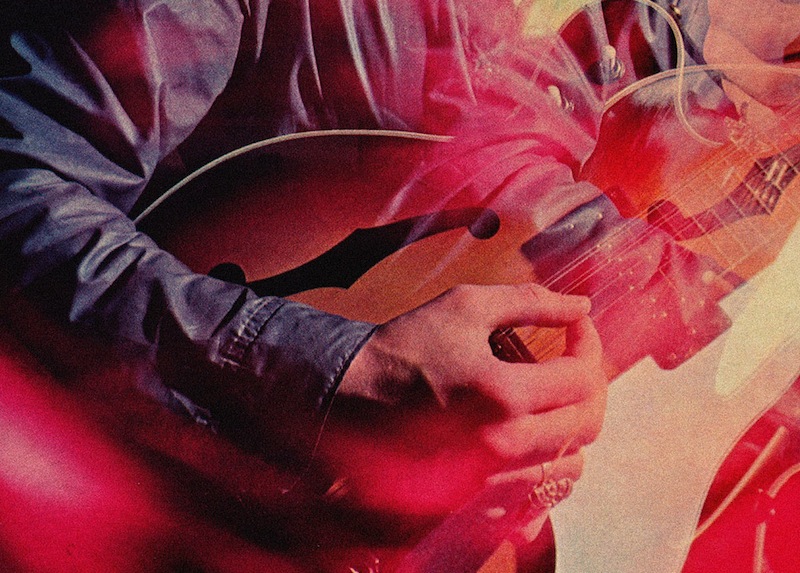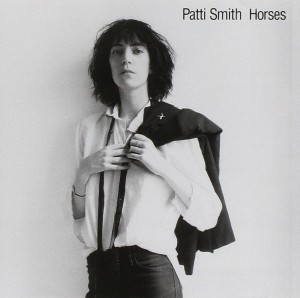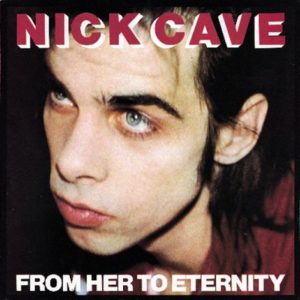10 Albums That Open With A Cover

In an age half a century removed from the era of standards, it seems weird to open an album with a cover song. Back in the ’50s and ’60s, it wasn’t so weird—in fact, albums mostly comprised tracks recorded by other artists. But then the era of the singer/songwriter, helmed by artists like Bob Dylan, ushered in a songwriting renaissance, and from that point forward things changed dramatically. Even The Beatles, whose earliest records were mostly covers, phased out the practice for what are now essentially the most treasured songs in the rock canon. But from time to time a band will in fact open their album with a cover, and it can dramatically change the context or direction of an album. Sometimes it’s just one great song among many, but in other cases it creates a curious prologue. In the case of Okkervil River, it’s an introduction to a conceptual arc’s main character. For Nick Cave, it opened a solo career with a nod to one of his heroes. And for Chromatics, it brought a dreamy, melancholy mood to an eerie synth-pop epic. These are not the only examples of the phenomena, but they are examples of how to do it right: Here are 10 great albums that open with a cover.
 Isaac Hayes – Hot Buttered Soul
Isaac Hayes – Hot Buttered Soul
Opening Cover: Dionne Warwick’s “Walk on By”
(1969; Stax)
The Burt Bacharach/Hal David tune first popularized by Dionne Warwick has a diverse resumé of covers from the worlds of dance-pop, adult contemporary, and even punk over its 53-year lifespan. The version that fits into this list simply towers above all others. Hot Buttered Soul is a methodical 45-minute-long R&B vamp, mostly on the works of other songwriters, that helped redeem both Isaac Hayes and the Stax label after a dismal 1968. Hayes’ opening arrangement of “Walk on By” de-emphasizes the sad-sack breakup lyrics in favor of majestic future-forward soul employing orchestral balladry later heard from Barry White and disco, as well as guitar work suggesting Jimi Hendrix and Parliament in equal measure. – Adam Blyweiss
 Patti Smith – Horses
Patti Smith – Horses
Opening cover: Them’s “Gloria”
(1975; RCA)
“Gloria,” the opening track on Patti Smith’s groundbreaking debut Horses, is something of a paradox. It’s not just a cover of Them’s early single, but at that point the latest stage in what was an ongoing pub rock live staple, having been performed by the likes of Status Quo and AC/DC early in their careers. And yet, it almost doesn’t even register as a cover. It’s considerably longer than the original, with a dramatic opening that finds Smith immortalizing it with her legendary sneer, “Jesus died for somebody’s sins, but not mine.” It rises up and explodes in a furious, intense reading of what was already a pretty rocking song. At some point this stop’s being Van Morrison’s track, and Smith simply claims it as her own. That Horses is, on the whole, a spectacular album feels like nothing short of a miracle. Following this track just seems like a fool’s errand. – Jeff Terich
 Blondie – Parallel Lines
Blondie – Parallel Lines
Opening cover: The Nerves’ “Hanging on the Telephone”
(1978; Chrysalis)
It’s a bold enough move to begin an album with someone else’s song, or at least it became that way after original compositions replaced standards as the common mode of LP tracklists. But to do so while improving upon the original is an even rarer feat. While The Nerves’ “Hanging on the Telephone” is no doubt a standout staple of ’70s-era power pop, Blondie took it to the next level, beefing up the attitude, the arrangement and production values to make it an enduring radio hit over the years. Deborah Harry adds an instant level of charisma to everything she touches, but the guitar riffs and Hammond organ turn the arrangement into a new wave dynamo. It’s not just one of the best opening covers of all time, but one of the best openers period. – Jeff Terich
 The Specials – More Specials
The Specials – More Specials
Opening cover: Guy Lombardo’s “Enjoy Yourself”
(1980; 2 Tone)
The Specials cashed in on their debut album buzz quickly, with More Specials hitting shelves just 12 months later. It found the band in more subdued, thoughtful form, several of its songs laced with nuclear paranoia and simmering political frustration. Strange, then, to kick it off with “Enjoy Yourself,” a cover of a fairly un-revelatory easy listening curio that had been a modest hit in 1949 for Guy Lombardo. It’s possible the band sensed unseen sardonic depths to the song, or it could be that they knew with what the rest of the album had in store, a straight-ahead knees-up celebration of life was 100 percent necessary. More Specials mutates before your ears, with singles “Do Nothing” and “Stereotypes” decidedly more reflective than their debut album counterparts, while later cuts “International Jet Set” and “I Can’t Stand It” are less funtime ska than proto-Animal Collective/Ariel Pink muddled psych-electropop. “Enjoy Yourself” makes a maudlin, brooding reprise at the album’s climax, with Terry Hall backed by Belinda Carlisle, Charlotte Caffey and Jane Wiedlin from The Go-Go’s, a disturbing, retrospectively defeatist take on a song that had seemed so unstoppably positive just 40 minutes earlier. Perhaps those depths were there after all. – Max Pilley
 Grace Jones – Nightclubbing
Grace Jones – Nightclubbing
Opening cover: Flash and the Pan’s “Walking in the Rain”
(1981; Island)
All but just a handful of the songs on Grace Jones’ reggae-tinged sophisti-pop classic Nightclubbing are covers, so it’s not necessarily all that strange that it begin with one as well. “Walking in the Rain” was originally a noir-wave cut on the self-titled debut album by Australian synth-pop outfit Flash and the Pan (featuring George Young, brother of AC/DC’s Angus and Malcolm). Backed by Jamaican rhythm section all stars Sly and Robbie and with a much slicker production, Jones’ art-pop dub take on the song is a catchier take with more depth and richness of sound, and a mysterious start to a strange and wonderful musical revue that finds her likewise taking on Iggy Pop (the title track), The Police (“Demolition Man”), Astor Piazolla (“I’ve Seen That Face Before”) and a short but notable list of new compositions, most notably sex-funk jam “Pull Up to the Bumper.” “Walking In the Rain” is a standout, but also a mood setter. How it hasn’t made it onto the soundtrack of The Americans is beyond me. – Jeff Terich
 Bauhaus – The Sky’s Gone Out
Bauhaus – The Sky’s Gone Out
Opening cover: Brian Eno’s “Third Uncle”
(1982; Beggars Banquet)
Bauhaus were particularly good at covers in their day. Their take on T. Rex’s “Telegram Sam” is such a tweaked, mutant version of the song it barely even sounds like the original. (And it’s awesome.) With Brian Eno’s “Third Uncle,” however, the effect is similar though not quite as alien. The tempo is raised, the noise level is amplified, and the energy level is explosive. It’s also maybe the most straightforward song on all of The Sky’s Gone Out. On “Silent Hedges” they enter a peculiar acoustic psychedelia, while “Swing the Heartache” finds them embracing the mechanical chill of darkwave, and the triple-part suite of “The Three Shadows” is goth-rock gone prog. The Sky’s Gone Out is all over the place, but “Third Uncle” is the band’s charged-up, punk rock opening shot that gets the adrenaline rushing before things get really weird. – Jeff Terich
 Nick Cave and the Bad Seeds – From Her to Eternity
Nick Cave and the Bad Seeds – From Her to Eternity
Opening cover: Leonard Cohen’s “Avalanche”
(1984; Mute)
It’s no secret that Leonard Cohen is one of Nick Cave’s biggest songwriting influences. Perhaps no other troubadours blend sex, religion, mythology, darkness and light into as moving and intense compositions as these two. That being said, a young Nick Cave turned Cohen’s most darkly unsettling track into something utterly horrifying at the opening of his debut album with the Bad Seeds, From Her to Eternity. The album, as a whole, is a pretty harrowing punk-blues journey, and with the gut-punch menace of this Cohen take helming it all, it feels like the creaky door opening into a haunted house. Walk inside…if you dare. – Jeff Terich
 Okkervil River – Black Sheep Boy
Okkervil River – Black Sheep Boy
Opening cover: Tim Hardin’s “Black Sheep Boy”
(2005; Jagjaguwar)
Okkervil River not only opened their 2005 album with Tim Hardin’s folk song “Black Sheep Boy,” they named the album after it. That gives it the sense of being a concept album, though the concept itself isn’t an easy one to follow (though neither is any Genesis or Yes album, so it’s fine). Ostensibly, the Black Sheep Boy is a character that passes through each song of conflict, dysfunction and redemption, though they could just as easily be songs about 10 separate people (even though the Black Sheep Boy is explicitly referenced later on). Yet the “Black Sheep Boy” cover that opens the record is unlike anything else here, in part because it’s so short. At 79 seconds long, it breezes by in a flash, a slight and subtle folk tune that gives way to the dramatic crashes and chaos of “For Real,” which finds frontman Will Sheff snarling, “Some nights I thirst for real blood.” Chilling stuff. This is an album as beautiful as it is intense, a high water mark for indie rock songwriting and storytelling. – Jeff Terich
 The Weeknd – Echoes of Silence
The Weeknd – Echoes of Silence
Opening cover: Michael Jackson-s “Dirty Diana”
(2011; self-released)
Abel Tesfaye has shone significant light on his music throughout the second half of his discography, standing in clubland’s bright beams and strobes to generate “Can’t Feel My Face” and “Earned It” and Daft Punk collaborations since 2013. But his first mixtapes as The Weeknd in 2011 earned both street and critical cred with a breathtaking form of R&B for and about dark, damaged, beautiful people. With production powered by moody and pounding electronics, and a vocal delivery inspired by titans of pop and soul from the 1980s and 1990s, it made sense for Tesfaye to kick off the last chapter of his mixtape trilogy with this Michael Jackson cut, a more visceral take on the avoidance of desperate groupies MJ first explored in “Billie Jean.” – Adam Blyweiss
 Chromatics – Kill for Love
Chromatics – Kill for Love
Opening cover: Neil Young and Crazy Horse’s “Hey Hey My My (Into the Black)”
(2012; Italians Do It Better)
The Portland quartet open their instant-classic fourth album covering one of Neil Young’s instant-classic bookend tracks from 1979’s Rust Never Sleeps. Ruth Radelet and Adam Miller explore wide open spaces with guitar and vocals that channel Cocteau Twins, The Sundays and the most gossamer moments of later Madchester, before quietly chugging synths kick in over the last 90 seconds. It’s a legitimate shoegaze fakeout before the band dive headlong into a melange of dream-pop and chillwave, and one of the starker arrangements on an otherwise relatively (if not darkly) pleasant album. – Adam Blyweiss

